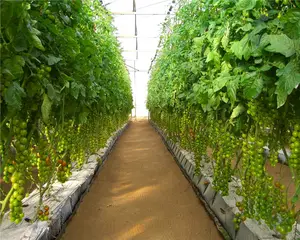Understanding Hydroponic Substrate
Hydroponic substrate is an essential component for growing plants in a soilless farming system. This innovative method of cultivation provides a uniform environment for roots to thrive, ensuring optimal nutrient uptake and moisture retention. It serves as the foundation for successful hydroponic growth, offering various materials that cater to different plant types and growth stages.
Types of Hydroponic Substrate
There are several types of hydroponic substrates available, each with unique characteristics catering to different gardening needs:
- Coconut Coir: A sustainable and biodegradable option that retains moisture well while providing good aeration.
- Pearlite: A volcanic glass that is lightweight and excellent for drainage, promoting root health.
- Rockwool: Known for its excellent water retention and insulation properties, making it a popular choice for seedlings.
- Expanded Clay Pellets: These are pH-neutral and provide great aeration, often used in a variety of hydroponic systems.
- Sand and Gravel: Generally used as a heavier substrate; offers great drainage but less moisture retention.
Applications of Hydroponic Substrate
Hydroponic substrates are versatile and can be used in various hydroponic systems to enhance plant growth. Common applications include:
- Greenhouses: Ideal for large-scale production of vegetables and herbs, providing an efficient growing environment.
- Vertical Farms: Hydroponic substrates help maximize space in urban settings by allowing for vertical growth of plants.
- Research and Development: Used in scientific studies to analyze plant behavior in controlled environments.
- Home Gardening: Perfect for hobbyists looking to grow plants in limited spaces with minimal soil mess.
Advantages of Using Hydroponic Substrate
The use of hydroponic substrates in cultivation systems brings several advantages over traditional soil gardening:
- Water Efficiency: Hydroponic substrates retain moisture while allowing excess to drain away, minimizing water usage.
- Faster Growth Rates: Optimized nutrient delivery through substrate ensures plants grow quicker than those cultivated in soil.
- Reduced Pests and Diseases: The absence of soil significantly lowers the risk of soil-borne pests and diseases.
- pH Neutrality: This helps in maintaining nutrient availability, allowing plants to absorb what they require without fluctuations.
- Environmentally Friendly Options: Many substrates, such as coconut coir, are made from renewable resources, reducing environmental impact.





















































